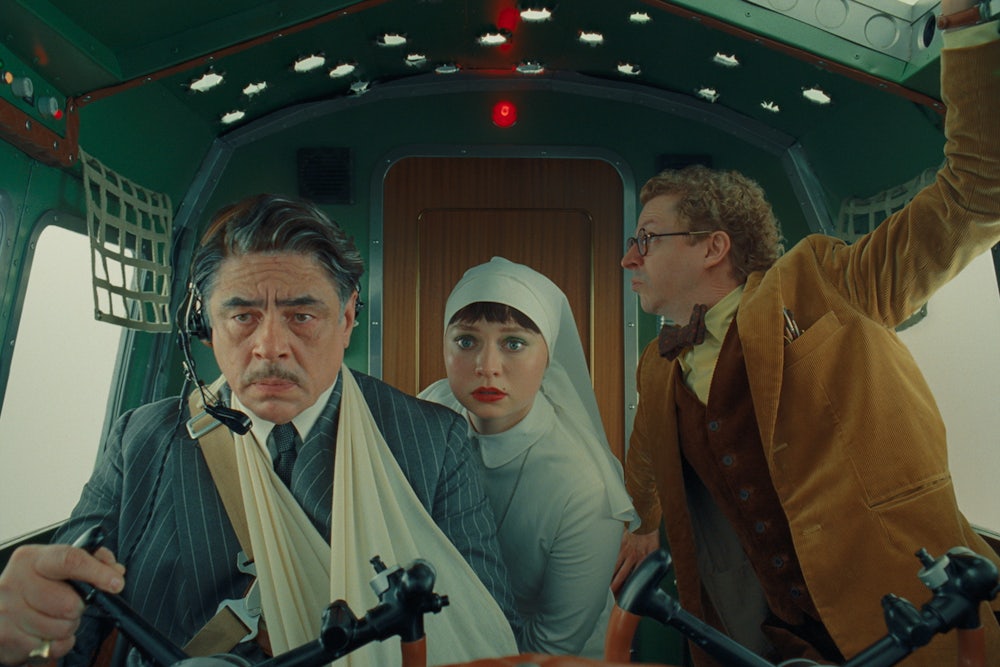For what shall it profit a man if he should gain the whole world, and lose his own soul? For Zsa-zsa Korda, the self-styled magnate at the center of Wes Anderson’s new mercantilist pastiche, The Phoenican Scheme, this is a rhetorical question. Mortgaging his better nature in exchange for money, power, and his family name plastered on the side of everything from factories to luxury jets has profited Korda nicely in a life spent trotting (and sometimes fleeing) around the globe. He’s OK with being a hollow man, so long as his outer shell remains indestructible.
The brand-name robber baron is an evocative archetype, especially at the current moment, but Korda is too appealing to be taken, even obliquely, for a Trump manqué. Rather, as inhabited with wry comic suavity by Benicio Del Toro, he’s a reprobate with a crooked sense of integrity, a leaning pillar of his chosen community of power brokers. In interviews at the Cannes Film Festival—where The Phoenician Scheme premiered just ahead of its wide theatrical release in the United States—Anderson explained that the character was inspired, loosely and lovingly, by his father-in-law, Fouad Mikhael Malouf, a Lebanese construction mogul (the film bears a poetic closing dedication in his name). That family connection is probably why the director stops short of making his protagonist a genuine bastard, and Del Toro, who’s never more magnetic than when inhabiting characters whose moral compasses are on the fritz, locates and sustains a precise sense of lordly self-absorption. “I feel perfectly safe,” Korda is given to saying, even as chaos swirls around him.
The Phoenician Scheme is set in a stylized version of 1950, in which Korda has parlayed his skills as a deal-maker—and his lack of scruples about labor and compensation—into an empire. Infamy precedes him: We learn via voice-over that he is “predeceased” by three wives—one of whom allegedly died by his hand—and estranged from his phalanx of biological children, nine sons and a now-twentysomething daughter, Liesl (Mia Threapleton). The last had been gotten safely to a nunnery several years before the beginning of the film in an attempt to evade her father’s enemies (and his malign influence). The enemies are legion: As the film opens, a transnational think tank has been convened to figure out how to take Korda down. The solution: toppling his holdings, piece by piece, by manipulating the global price of the rivets holding them together.
The Phoenician Scheme has been styled in bespoke sans-serif quotation marks as a thriller; certainly, it’s the closest that Anderson—who doesn’t so much work in genres as subsume them into his auteurist universe—will come to making Die Hard. The opening sequence shows Korda cruising serenely at 5,000 feet in his private plane before a bomb explodes the fuselage (and obliterates the unfortunate factotum riding in the back, who’s blown in half, cartoon-style, by impact). Clearly inured to such midair assassination attempts, Korda calmly commandeers the cockpit controls, ejects the insufficiently deferential pilot, and crash-lands, roughly but successfully, in a cornfield. Briefly incapacitated, he experiences a quasi-religious vision, relayed to him (and us) in gleaming, Bergmanesque black-and-white: a funeral, presided over by Old Testament figures, that seems to be his own. That little shiver of mortality is enough to make Korda think twice about his soul, and what it might cost to reclaim it. Step one in his pilgrim’s progress is reconnecting with Liesl, whose gig as a novitiate suggests the possibility of absolution.
The existential angst of ethically suspect patriarchs is an Andersonian specialty, and there’s a dissertation or two to be written about his cinema as a series of paternal pathos plays. Zsa-zsa Korda is a tough old sonofabitch in the same irascible tradition as Gene Hackman’s Royal Tenenbaum or Bill Murray’s Steve Zissou—or Murray’s magisterial magazine editor, Arthur Howitzer Jr., in The French Dispatch (2021). Such familiarity, which extends to form as well as content (you know those aforementioned quotation marks are in Futura), breeds extreme reactions on the spectrum from contempt to esteem. Love him or hate him, Anderson’s cinema is instantly recognizable; his frames are like calling cards. For a filmmaker to repeat himself so skillfully—to keep wringing surface variations on a theme, while keeping those surfaces pathologically gleaming and neat—suggests a sort of ironclad conviction. As Korda himself likes to say by way of a mantra, “Break, but never bend.”
I myself have felt that Anderson has been testing his own breaking point for a while now. Or maybe I’d just reached mine. There’s a limit to even the most exquisite whimsy, with its perilous proximity to mere regurgitative mannerism—not that Anderson has fully activated my own personal gag reflex. There was some affecting analog nostalgia in The French Dispatch, which romanticized both the printed word and the joy that earlier generations took in absorbing it, and plenty of sophisticated ideas in Asteroid City (2023), an intricate, Matryoshka dollhouse of a movie featuring plots within plots and dreams within dreams. “You can’t wake up if you don’t fall asleep” went that film’s central manifesto, repeated somnambulistically by its entire cast, and it’s true that a sort of quasi-hypnotic torpor is a big part of the director’s arsenal. A friend of mine texted after a screening of The Phoenician Scheme to say she found “the whole thing lulling,” adding parenthetically that this was a positive. The idea of The Phoenician Scheme as a relaxation aid is funny—flatlined dialogue as Auteur ASMR—but also belies the film’s complexities as a character study and a geoeconomic burlesque. Beneath the soporific surfaces lurks an alert satirical intelligence.
On one level, Anderson’s movies serve as playgrounds for A-list actors to demonstrate their comic agility, and he keeps widening his repertory. In addition to Del Toro, who was hilariously intense in The French Dispatch as a jailed painter, return performers in The Phoenician Scheme include Scarlett Johansson, F. Murray Abraham, Tom Hanks, Bryan Cranston, Jeffrey Wright, Benedict Cumberbatch, Willem Dafoe, and Bill Murray (cast, appropriately enough, as God in the aforementioned dream scenes). He’s also got a knack for discovering fresh talent, like the wonderful child performers in Moonrise Kingdom and Asteroid City, or the Wilson brothers in his first feature, Bottle Rocket (1996), or the then-adolescent Jason Schwartzman in Rushmore (1998)—still one of the great debut performances, and still the gold standard for Anderson’s core currency, precocious melancholia. Here, he coaxes a superbly funny and controlled performance from the 24-year-old Threapleton, who maybe doesn’t quite qualify as a find in light of being Kate Winslet’s daughter, but whose talent is real. If the character of Zsa-zsa Korda offers the pleasures of familiarity—imbued with elements from Del Toro’s own personal rogues’ gallery as well as Anderson’s various alpha males—Liesl is a winningly original creation: a model of poised, picture-perfect piety who keeps stoically succumbing to temptation.
Korda’s proposal to Liesl is simple: Help him out of his current jam—a financing crisis precipitated by the “Phoenician scheme” of the title, with its multiple, interlocking construction projects—and she stands to inherit everything he owns. At first, Liesl wants no part of her father or his worldly possessions, but she decides to accept his presence in her life on a “trial basis.” Gradually, she warms to the hectic, perilous pace of their adventures together and the exotic charms of Bjorn (the eternally gangly Michael Cera, a millennial hipster–comedy figurehead somehow making his Wes World debut), her deeply smitten new tutor, who shares his knowledge of insect biology and rituals in a (suspiciously) thick Norwegian accent. “Are you an atheist?” Liesl queries him coolly, turquoise tights peeking out from beneath her resplendent white habit. “I’m a man of science,” he replies in a tone suggesting passionate depths of earthly devotion.
It’s Bjorn who (respectfully) plies Liesl with beers and mixed drinks as her father goes on his requisite wild-goose chase, gradually accruing companions (and complications) in the shaggy-dog, road-movie manner with which Anderson tends to plot his mock blockbusters. The central joke, and it’s a good one, is that Korda’s lack of ideological scruples in an era of postwar chill makes him desirable and detestable to his strange bedfellows: He’s equally at home finessing (or being threatened) by CIA operatives, Middle Eastern princes, and Communist hit squads alike. Meanwhile, the film’s true villain, Zsa-zsa’s brother Nubar (Cumberbatch), has eyes like Rasputin’s and a beard to match—or maybe he’s a malevolent doppelgänger for another revolutionary mystic. Perched over a scale model combining Zsa-zsa’s dream projects, Uncle Nubar could be the specter of communism haunting (or yearning for) a miniature-industrialist Utopia—a slapstick vision of Karl Marx.
As in the Oscar-nominated The Grand Budapest Hotel (2014), which allegorized twentieth-century European fascist creep while scooping out plenty of pesky historical specifics, the approach in The Phoenician Scheme to historical analysis could be characterized as designer Teflon. But there are mitigating factors, including swifter, simpler storytelling; fewer crocodile-tear-strewn emotional moments; and a hint of the same self-reflexive questioning that elevated Asteroid City. The scheme in The Phoenician Scheme is a matter of “gap financing”—of wrangling and finessing investors in the service of a common goal. The not-so-buried subtext of this MacGuffin is, clearly, the filmmaking process—just as it was in Brady Corbet’s The Brutalist, a considerably more lugubrious meditation on art and commerce that played at times like one of Anderson’s portraits-of-the-blowhard farces blown wildly out of proportion and projected at the wrong speed.
The real common denominator between Anderson and Corbet—and all the other directors whose surnames serve as selling points for indie moneymen and discerning art-house audiences alike—is the gravitas that comes with having final cut: of making a movie without anybody looking over one’s shoulder, except maybe some deep-pocketed guardian angel. It’s interesting then, that as much as Anderson clearly identifies with—and enjoys skewering—Korda’s boundless in-house resources (every time Korda meets up with a contact, he offers them a personalized hand grenade), he’s ultimately crafted The Phoenician Scheme as a fable about the importance of divestment, and the embrace of modest pleasures. The final sequence, set in a cramped, lived-in restaurant kitchen, plays, sweetly and seemingly sincerely, as a tribute to expertise without excess. What Anderson’s own cinema might look like stripped down from its deluxe textures is a diverting thought experiment—and a hypothetical at least as compelling as anything he’s actually put on screen.










